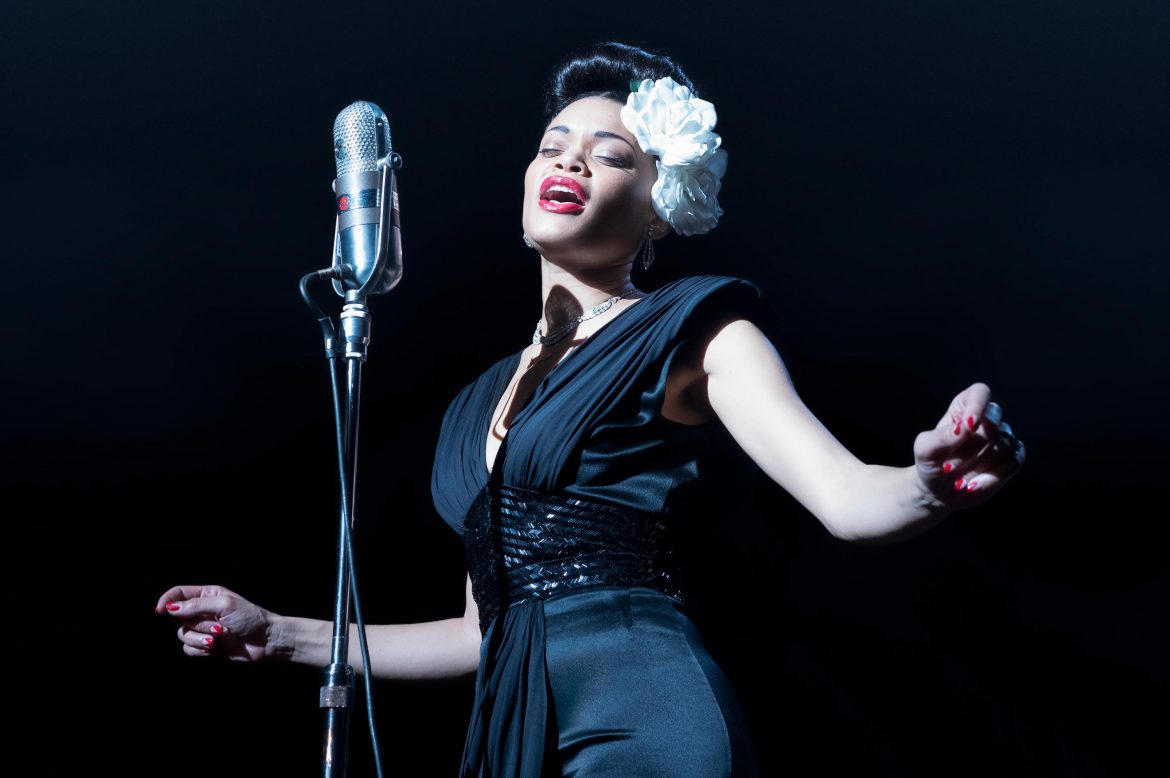On February 26th, The United States Vs. Billie Holiday premiered on Hulu. The film, which tells the true story of Billie Holiday’s tumultuous life, is already receiving Oscar buzz. Director Lee Daniels wanted to reveal the oft-unspoken reality of Billie Holiday’s life. Throughout her career, Holiday struggled with heroin addiction and abuse. The US government tried to exploit this in order to prevent Holiday from singing her song ‘Strange Fruit’ which depicted the lynching of Black people in the American South.
The Federal Bureau of Narcotics began investigating Holiday’s heroin and cocaine addiction with the hopes of using it against her, to both soil her public image and to curb her from openly singing about racism. Holiday, however, was a force to be reckoned with. She never backed down. She continued singing and fighting back until the day she died.
Playing Holiday in the film is musician Andra Day, who won a Golden Globe for Best Actress in a Drama for her portrayal, and is nominated for an Academy Award for Best Actress in a Leading Role. I had the honor to speak with both Daniels and Day to discuss race, Hollywood, and Billie Holiday.

Da’Vine Joy Randolph and Andra Day in The United States Vs. Billie Holiday (photo: Takashi Seida)
For starters, I want to know what drew you to the story of Billie Holiday. What made it stand out to you?
Lee Daniels: Well, my whole career came to be thanks to Lady Sings the Blues (the Billie Holiday biopic from the 70s). The movie totally blew my mind, it just spoke to me. The music was divine. The costumes were breathtaking. Diana Ross was stunning. I got to see Black culture in a way I never had before on-screen. So, the movie really helped inspire me to create films of my own.
What I didn’t realize as a kid was that Lady Sings the Blues wasn’t the whole story of Holiday’s life. It was the Black story our community needed at the time. It was the Black love story we all needed to see, but it wasn’t the real story of Holiday’s life. So, I was excited to get to work on a more factual account of her life and career.
Andra Day: I actually never thought I’d be in the movie! I’ve always loved Billie Holiday, and she’s been a huge influence on my music career. But I’m not really an actress, so I was terrified at my audition. But Lee really saw something in me, and he was so supportive.
I was really interested in the fact that this movie focused on how the government came after Billie under the guise of the war on drugs. I didn’t want to remake Lady Sings the Blues because I felt the movie was simply untouchable. I love that this film does a much deeper dive.
Lee, as a Black filmmaker, what was it like getting into the industry knowing that Black stories weren’t being told?
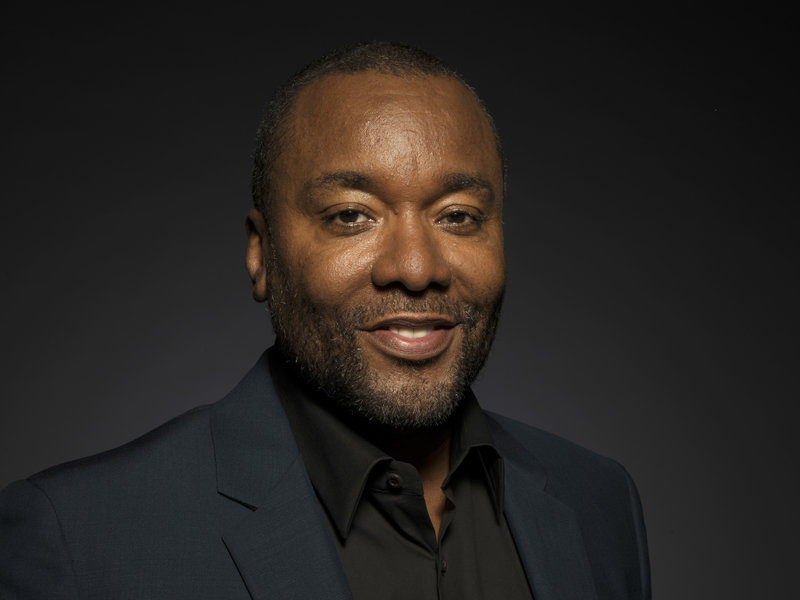

Lee Daniels (Photo: Ron Eschel)
Daniels: Well, I always felt like there wasn’t “true cinema” being made for the Black community. You know, like movies that would wind up in the Criterion Collection. There wasn’t Black indie filmmaking, so I always wanted to do that. And to this day, all of my movies have been made independently. I’ve just never been able to rely on Hollywood. But yeah, I think it’s great to see the surge of Black cinema we’re seeing right now.
It’s interesting that you say that, because I loved your film ‘The Paperboy’. It showcases that indie influence you’re talking about. You can tell that movie was made from passion, not from being tested through focus groups.
Daniels: And you know what, lots of people hated it! The Paperboy did really well at the Cannes Film Festival, but then tons of critics didn’t like it. I’m kind of in my own lane as a Black, gay filmmaker. I see the world from a very specific lens. And sometimes people get it, and sometimes they don’t. But I always know the movie I’m trying to make, whether they like it or not.
‘The United States Vs. Billie Holiday’ is going to tell a very different story of Holiday than most audiences are probably expecting. Your film focuses on her struggles with heroin, the federal investigation that tried to silence her, and even her queer romance with Tallulah Bankhead. When you started making this movie, did you know you might be challenging the audience’s beliefs of what they thought they knew?
Daniels: I didn’t even know she had relations with Tallulah until I started doing research for the film! I didn’t discover that until I started reading the letters she wrote. And I think that’s because Holiday never made a big deal out of it. Everyone else did, but Holiday didn’t care. Just like she didn’t care that the government didn’t want her singing ‘Strange Fruit’. She was like, this is my song, I’m gonna sing it.
But yeah, I fully understand that not everyone wants to hear the truth. The truth can be polarizing, and some audiences just want to be entertained. They don’t want the truth put in front of their face.
Day: I’m excited for people to see that Billie Holiday was extremely progressive, and she just wanted to be herself. There were lots of people who tried to hide those facts, but she was always bravely being herself. And through being herself, regardless of the consequences, she fought for marginalized communities.
Many of Billie Holiday’s experiences with men were extremely abusive. So, I think she found real love and real friendship in women. Almost a sense of safety. I hope people see that and understand that.
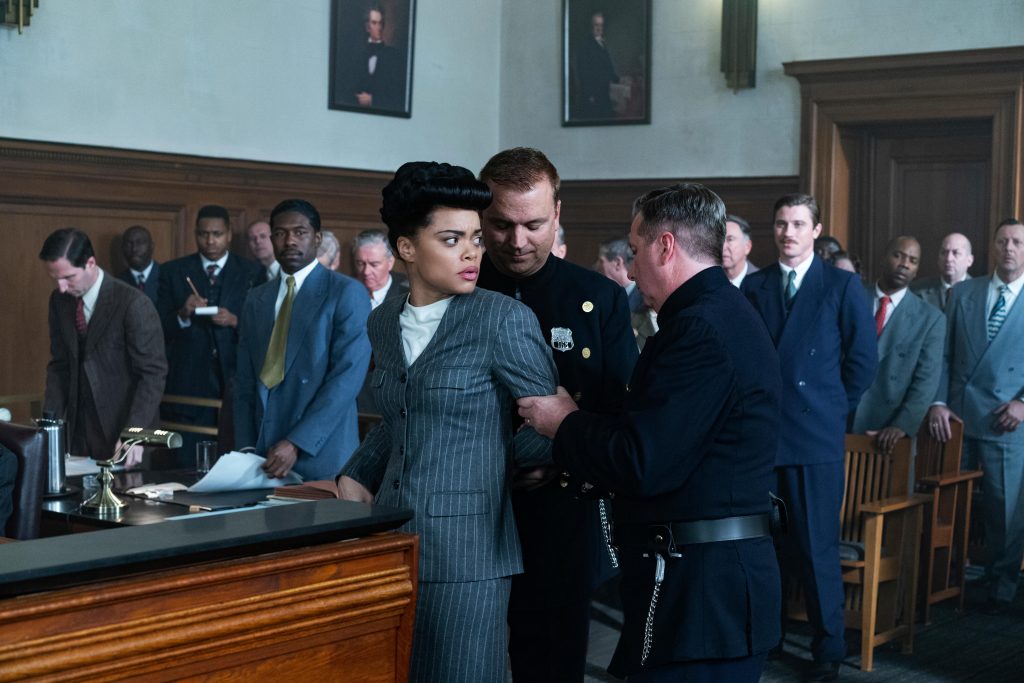

Andra Day as Billie Holiday (Photo: Takashi Seida)
It’s almost as if this film is not only going to educate people on what really happened to Holiday, but it’s also going to serve as an act of protest…as a way to show the truth, even if some people would rather not hear it. Plus, the timing couldn’t be more fitting. After the Trump administration, June’s BLM movement, and the Capitol Riot, I think a lot of white Americans are starting to realize that they’ve willingly had their eyes closed and have been blinded to the reality of racism.
Daniels: There were even some Black people who were turning a blind eye! Truth is hard and scary, and it’s easy for people to try and ignore it. I’ve even had blinders on in the past. As a gay, Black man, if I had allowed myself to see all the racism and homophobia around me…if I allowed myself to know how difficult it is for a Black person to make it in the film industry…I wouldn’t be here right now. I don’t even know where I’d be. I lived in denial for a long time because the truth was just too painful.
And you know, the 2020 election served as a really ugly wake-up call. It showed us that a big portion of America has said they don’t want to change. It really made you feel like America was no longer home, and no longer safe. The problem is that racism is like an aerosol. It’s everywhere, but you can’t physically see it. And because it’s everywhere, it’s been ingrained in us all since birth. It was here before our parents. And their parents. And their parents’ parents… Unfortunately, it’s part of the foundation of America. And I’m hoping this movie will help people see that more clearly.
My movie The Butler was a product of the times. Obama was in office. I felt like there was hope. It was a joyous movie. And Billie’s movie is how I’m feeling now. We’ve seen the damage that one administration was able to make in our country. And we all saw it coming. We all felt it coming.
Day: I absolutely see this as a form of protest. I think that we’re at our best when we’re serving the community. And part of serving the community means calling out injustice and informing people of the truth.
The whole federal investigation into Billie was designed to take her down. She was too famous for the government to completely destroy, so instead, they tried rewriting her narrative as a drug-addicted troublemaker.
And you know, history masked it. There’s a reason why this isn’t in the history books…and it’s the same with Hidden Figures. There’s a reason why society had no idea it was three Black women who helped get us into space. It’s all part of systemic racism. These stories have been hidden away from much of America for decades. And that’s why it’s so important to really uncover the whole truth, especially for marginalized people. You can’t have a true image of a nation unless you’re telling everyone’s stories.
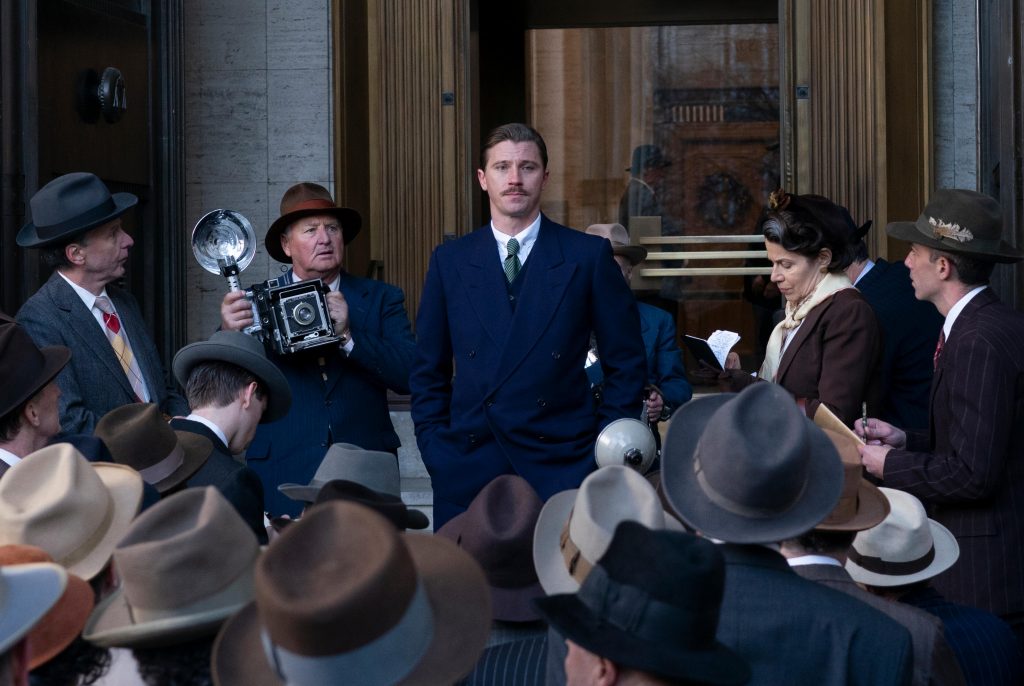

Garrett Hedlund as Harry Anslinger in The United States Vs. Billie Holiday (Photo: Takashi Seida)
What do you hope people take away from ‘The United States Vs. Billie Holiday’?
Daniels: I hope people see that civil rights leaders come in all shapes and sizes. They don’t need to be religious figures or politicians. They can have issues just like Billie did. Even people who think they’re “damaged” can do wonderful things. I mean, Billie literally took on the government simply by continuing to sing her song!
Day: First, I really hope audiences can see what she sacrificed from singing that song. These days, we’re used to protest music. But back then, singing ‘Strange Fruit’ was a powerful and revolutionary act of resistance.
I also want people to see the power of Black women. No matter how poorly people treat us, the resilience of Black women is so incredibly powerful. I want people to see what that looked like in Billie Holiday’s time so they can see that we’re still powerful to this day.
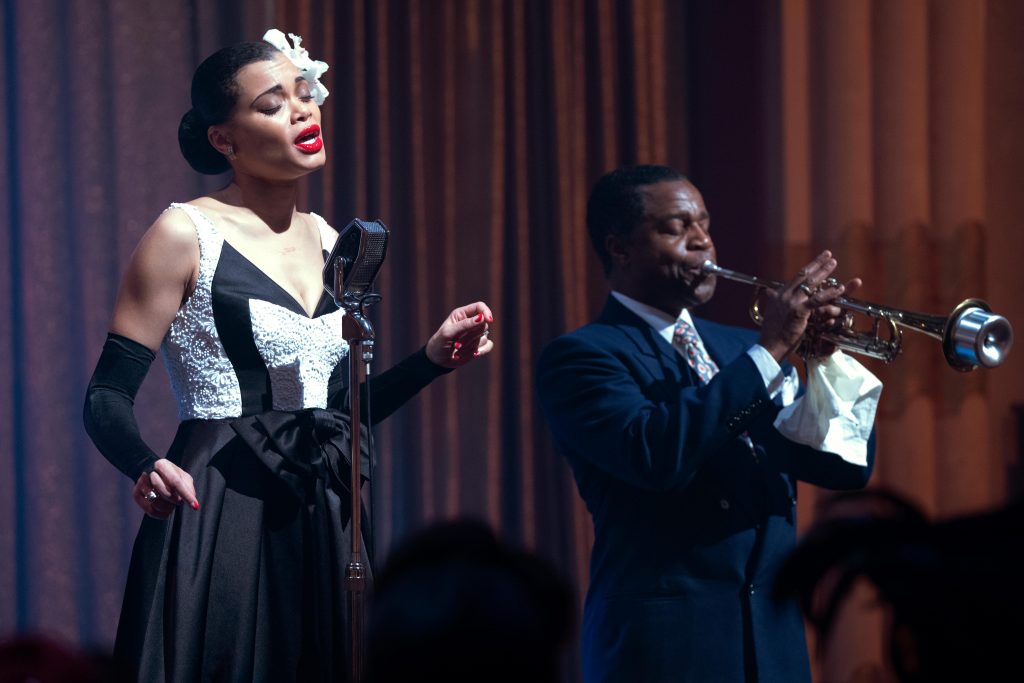

Andra Day and Kevin Hanchard in The United States Vs. Billie Holiday (Photo: Takashi Seida)
Finally, do you think Hollywood is trying to change? Are you noticing any differences? Are inclusivity and diversity actually happening, or are they just words being thrown around?
Daniels: My fear is that Hollywood feels like it’s politically correct to talk about diversity and inclusivity because they fear they’ll be shamed if they don’t. But I don’t know if the studios actually have any intentions of changing. I think that until there are Black people greenlighting films at major studios, and Black people writing the checks, then real, lasting change can’t be made.
But one thing I will say is that I’ve had a lot of young filmmakers come up to me and say that I inspired them. Especially a lot of young, gay filmmakers. So, it makes me feel good, like I’ve accomplished something.
‘The United States Vs. Billie Holiday’ is available on Hulu.
Watch the trailer here:
You May Also Enjoy:
Magee, Dodd and King — Creators and Hosts of “The Sip”
LENOX MAGEE, DAVID DODD & ISAAC KING – CREATORS AND HOSTS OF THE SIP


